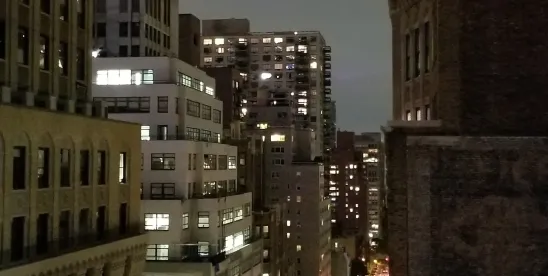The Foreclosure Abuse Prevention Act (“FAPA”) has been heavily litigated since its enactment in December 2022. New York courts have issued conflicting decisions interpreting FAPA, including whether the statute applies retroactively to conduct that occurred prior to its enactment and whether retroactive application is unconstitutional. Lenders, mortgage servicers, and other financial institutions should take note that the Second Circuit has certified the question of FAPA’s retroactive application to the New York Court of Appeals. Thus, there will finally be a definitive answer regarding retroactivity.
In East Fork Funding, LLC v. U.S. Bank, National Association, As Trustee For Greenpoint Mortgage Funding Trust Mortgage Pass-Through Certificates, Series 2006-AR6, 2024 WL 4351792 (2d Cir. Oct. 1, 2024), the Second Circuit certified the question of whether Sections 4 and/or 8 of the Foreclosure Abuse Prevention Act (“FAPA”), codified under Sections 203(h)[1] and 3217(e)[2] of New York’s Civil Practice Law and Rules (“CPLR”), apply retroactively to a voluntary discontinuance of an action that occurred prior to FAPA’s enactment. The Court of Appeals’ answer to this certified question will resolve conflicting decisions in the New York courts regarding whether FAPA applies retroactively.
Summary of Facts & Background
In 2006, Sean and Patricia Dros (“Borrowers”) took out a loan to purchase property in Queens, New York. The Borrowers defaulted under the mortgage and the prior lender, GMAC Mortgage, LLC (“GMAC”), commenced a foreclosure action in July 2010 (“First Foreclosure”). In May 2011, GMAC voluntarily discontinued the First Foreclosure. In November 2011, GMAC commenced a second foreclosure action (“Second Foreclosure”). During the pendency of the Second Foreclosure, the loan was assigned to defendant U.S. Bank, National Association (“U.S. Bank”). In 2016, the Second Foreclosure was voluntarily discontinued. In July 2016, U.S. Bank commenced a third foreclosure action (“Third Foreclosure”). As of the date of the parties’ briefing of the appeal before the Second Circuit, a foreclosure sale had not yet occurred.
In 2016, plaintiff East Fork Funding, LLC (“East Fork”) purchased the property though a judicial foreclosure sale in a separate foreclosure action that the board of managers of Borrower’s condominium association commenced for unpaid common charges. In 2020, East Fork commenced this quiet title action against U.S. Bank seeking to cancel and discharge the mortgage on the grounds that Schedule A to U.S. Bank’s mortgage describes a different property than the property against which it was recorded and, therefore, is not a valid encumbrance. The parties filed cross-motions for summary judgment.
While the summary judgment motions were pending, the New York State legislature enacted FAPA on December 30, 2022. The parties then filed supplemental briefing on the question of whether FAPA would time-bar any future foreclosure action because, under FAPA, the voluntary discontinuances of the First and Second Foreclosures did not reset the statute of limitations to foreclose.
In March 2023, the District Court for the Eastern District of New York granted East Fork’s motion and denied U.S. Bank’s motion, holding (1) FAPA applies retroactively to the prior voluntary discontinuances and, therefore, the statute of limitations ran before East Fork commenced the quiet title action; (2) retroactive application of FAPA does not violate the Contracts Clause; and (3) even if FAPA did not apply to the prior discontinuances, the statute of limitations had still expired because the 2011 and 2016 discontinuances did not reset the statute of limitations even under pre-FAPA case law. U.S. Bank appealed to the Second Circuit.
On appeal, U.S. Bank argued that (1) FAPA does not apply retroactively to a voluntary discontinuance that occurred prior to the enactment of FAPA; (2) retroactive application would violate the Contracts Clause, the Takings Clause, and the Due Process Clause of the U.S. Constitution; and (3) if FAPA does not apply, the statute of limitations has not expired because the First and Second Foreclosures were discontinued before the six-year statute of limitations expired. East Fork argued that (1) as a matter of statutory interpretation, FAPA does apply retroactively; (2) retroactive application is not unconstitutional; (3) if FAPA does not apply, the statute of limitations has expired because the First and Second Foreclosures were not properly discontinued because, among other things, GMAC was not the noteholder at the time the Second Foreclosure was discontinued and, therefore, it had no contractual right to revoke acceleration and the First Foreclosure was not discontinued in strict compliance with CPLR 3217; and (4) it is entitled to quiet title even if the statute of limitations has not run.[1]
The Second Circuit’s Decision
The issue on appeal was whether the voluntary discontinuances of the First and Second Foreclosures reset New York’s six-year statute of limitations to foreclose. The Second Circuit noted that whether, and to what extent, FAPA applies retroactively to voluntary discontinuances is necessary to resolve the appeal and is an issue of first impression for New York’s Court of Appeals. As such, the Second Circuit certified the question of whether FAPA applies retroactively to the Court of Appeals.
The Second Circuit explained why it exercised its discretion to certify the question of FAPA’s retroactivity. First, the Court of Appeals has not addressed FAPA’s retroactive scope. In addressing this factor, the Second Circuit noted that New York’s Appellate Division has not issued decisions sufficient to determine how the Court of Appeals would rule. Although New York’s Appellate Division, Second Department has applied FAPA retroactively, some lower courts have not followed these decisions because the Second Department gave “FAPA’s provisions retroactive effect without so much as mentioning the issue of ‘retroactivity’ or conducing the analysis required by [Regina Metropolitan][2] to determine whether the legislation is to be retroactively applied.” 2023 WL 4351792, at *6 (internal citations omitted). Second, the Court of Appeals indicated that the plain language in FAPA does not dictate the answer because it is not clear in the statute whether it must also apply to a voluntary dismissal of a foreclosure action that itself is no longer pending. Third, the Court of Appeals stated that FAPA’s implications have an effect on the New York mortgage market, property owners, and state law governing retroactive application of statutes. Fourth, answering the certified question is necessary to resolve the appeal. Finally, the Second Circuit noted that the Court of Appeals will eventually render a decision on this issue, and FAPA “is susceptible of an interpretation that would eliminate the constitutional issue” in this case. Id. at *7.
Conclusion
Since the enactment of FAPA in December 2022, the New York trial courts have reached conflicting conclusions regarding FAPA, including its retroactive application and constitutionality. As noted in the Second Circuit’s decision, the Appellate Division, Second Department’s FAPA decisions have not analyzed the parties’ arguments concerning these issues in cases where the Second Department applied FAPA retroactively to voluntary discontinuances that occurred before FAPA’s enactment. Instead, in many cases, the Second Department has remanded the case back to the trial court to further brief the issues, and trial courts have continued to disagree on whether FAPA is retroactive and unconstitutional. Further, although the Appellate Division, First Department held that FAPA applies retroactively, it did not consider whether the retroactive application of FAPA is unconstitutional. By certifying FAPA’s retroactive application to the Court of Appeals, lenders, mortgage servicers, and other financial institutions will finally have a definitive and binding answer regarding whether FAPA applies retroactively to unilateral voluntary discontinuances effectuated prior to FAPA’s enactment. Once the Court of Appeals issues a decision on this certified question, the Appellate Divisions and trial courts will be bound by it and should take a more uniform approach to adjudicating motions based on FAPA, including motions involving de-acceleration letters that revoked acceleration prior to FAPA’s enactment. Until then, it is possible that the Appellate Divisions and/or the trial courts may delay their decisions involving FAPA to prevent additional litigation.
Whatever the outcome, the Court of Appeals’ decision regarding retroactivity will have significant implications for lenders, servicers, and other financial institutions. For instance, if the Court of Appeals holds that FAPA only applies to conduct that occurs after FAPA was enacted and does not apply to the voluntary discontinuance of a foreclosure action before FAPA was enacted, it would be a huge victory for lenders, servicers and other financial institutions; foreclosure actions that were commenced after a de-acceleration through the voluntary discontinuance of a prior foreclosure action would be valid. However, if the Court of Appeals holds that FAPA applies retroactively to voluntary discontinuances that were effectuated prior to FAPA’s enactment, some pending foreclosure actions may be time-barred, resulting in a windfall for delinquent borrowers and/or real estate investors.
[1] Specifically, East Fork argued that the mortgage is not a valid encumbrance upon the subject property, U.S. bank is estopped from arguing otherwise, and the judgment of foreclosure and sale in the Third Foreclosure is not binding on East Fork due to jurisdictional and other defects.
[2] Regina Metro. Co. v. New York State Div. of Hous. & Cmty. Renewal, 35 N.Y.3d 332 (2020).
[1] “Claim and action upon certain instruments. Once a cause of action upon an instrument described in subdivision four of section two hundred thirteen of this article has accrued, no party may, in form or effect, unilaterally waive, postpone, cancel, toll, revive, or reset the accrual thereof, or otherwise purport to effect a unilateral extension of the limitations period prescribed by law to commence an action and to interpose the claim, unless expressly prescribed by statute.” CPLR 203(h).
[2] “Effect of discontinuance upon certain instruments. In any action on an instrument described under subdivision four of section two hundred thirteen of this chapter, the voluntary discontinuance of such action, whether on motion, order, stipulation or by notice, shall not, in form or effect, waive, postpone, cancel, toll, extend, revive or reset the limitations period to commence an action and to interpose a claim, unless expressly prescribed by statute.” CPLR 3217(e).




 />i
/>i

